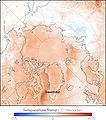This is an old revision of this page, as edited by NewsAndEventsGuy (talk | contribs) at 20:28, 28 April 2014 (Undid revision 606229941 by Prokaryotes (talk) Rest of my revert). The present address (URL) is a permanent link to this revision, which may differ significantly from the current revision.
Revision as of 20:28, 28 April 2014 by NewsAndEventsGuy (talk | contribs) (Undid revision 606229941 by Prokaryotes (talk) Rest of my revert)(diff) ← Previous revision | Latest revision (diff) | Newer revision → (diff)Polar amplification also referred to as Arctic amplification, is the greater temperature increases in the Arctic compared to the earth as a whole as a result of the effect of feedbacks and other processes It is not observed in the Antarctic, largely because the Southern Ocean acts as a heat sink and because seasonal variations in snow cover are small in the Antarctic. It is common to see it stated that "Climate models generally predict amplified warming in polar regions", e.g. Doran et al. However, climate models predict amplified warming for the Arctic but only modest warming for Antarctica.
See also
References
- Arctic Climate Impact Assessment - International Arctic Science Committee
- ^ "Antarctic cooling, global warming?". RealClimate. 3 December 2004.
- Doran, Peter T.; Priscu, John C.; Lyons, W. Berry; Walsh, John E.; Fountain, Andrew G.; McKnight, Diane M.; Moorhead, DL; Virginia, RA; et al. (31 January 2002). "Antarctic climate cooling and terrestrial ecosystem response". Nature. 415 (6871): 517–20. doi:10.1038/nature710. PMID 11793010.

